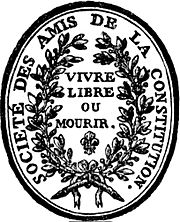Jacobin club
| French: Club des Jacobins | |

|
|
| Motto | "Live free or die" (French: Vivre libre ou mourir) |
|---|---|
| Successor | Panthéon Club |
| Formation | 6 October 1789 |
| Founder | Antoine Barnave |
| Founded at | Versailles, France |
| Extinction | 11 November 1794 |
| Type | Advocacy group |
| Legal status | Inactive |
| Purpose |
Establishment of a Jacobin society:
|
| Headquarters | Dominican convent, Rue Saint-Honoré, Paris |
|
Region
|
France |
| Methods | From democratic initiatives to public violence |
|
Membership (1793)
|
Around 500,000 |
|
Official language
|
French |
|
President
|
Antoine Barnave (first) Maximilien Robespierre (last) |
|
Key people
|
Brissot, Robespierre, Adrien Duport, Jean-Paul Marat, Desmoulins, Mirabeau, Danton, Billaud Varenne, Paul Barras, Collot d'Herbois, Saint-Just |
| Subsidiaries |
Newspapers: |
| Affiliations |
All groups in the National Convention |
Establishment of a Jacobin society:
Newspapers:
All groups in the National Convention
The Society of the Friends of the Constitution (French: Société des amis de la Constitution), after 1792 renamed Society of the Jacobins, Friends of Freedom and Equality (French: Société des Jacobins, amis de la liberté et de l'égalité), commonly known as the Jacobin Club (Club des Jacobins) or just collectively Jacobins (French: [ʒa.kɔ.bɛ̃ ], English /ˈdʒæ.kə.bɪnz/), was the most famous and influential political club in the development of the French Revolution. Initially founded by anti-Royalist deputies from Brittany, the Club grew into a nationwide republican movement, with a membership estimated at a half million or more. The Jacobin Club was heterogeneous and included both prominent parliamentary factions of the early 1790s, the radical Mountain and the more moderate Girondists.
In 1792–93, the Girondists (led by Brissot and including Thomas Paine) dominated the Jacobin Club and led the country. Believing that revolutionary France would not be accepted by its neighbours, they called for an aggressive foreign policy and forced war on Austria. The Girondists were the dominant faction when the Jacobins overthrew the monarchy and created the republic. When the Republic failed to deliver the unrealistic gains that had been expected, they lost popularity. The Girondists sought to curb fanatical revolutionary violence, and were therefore accused by the Mountain of being royalist sympathisers. The National Guard eventually switched its support from the Girondists to the Mountain, allowing the Mountain to stage a coup d'etat.
...
Wikipedia
